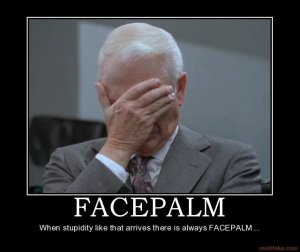 So the romance world has another outrage to deal with, but this time it’s been perpetrated on us rather than by us. A writer named John Havel decided to “expose” Amazon’s bestseller list practices by plagiarizing a novel and then manipulating it onto the list. Havel justified himself by saying that all the profits he made through his project would be donated to charity. So even though his whole enterprise was based on theft of someone else’s labor, it was okay because he was both demonstrating Amazon’s dishonesty and not keeping the profits for himself. Kat Mayo has summarized this entire saga, and you can read about it here.
So the romance world has another outrage to deal with, but this time it’s been perpetrated on us rather than by us. A writer named John Havel decided to “expose” Amazon’s bestseller list practices by plagiarizing a novel and then manipulating it onto the list. Havel justified himself by saying that all the profits he made through his project would be donated to charity. So even though his whole enterprise was based on theft of someone else’s labor, it was okay because he was both demonstrating Amazon’s dishonesty and not keeping the profits for himself. Kat Mayo has summarized this entire saga, and you can read about it here.
This whole project was, of course, ethically suspect from the beginning. But it might have been less so had Havel chosen a book that was truly in the public domain (Moby-Dick with a sexy new cover, for example). But instead, he chose a Harlequin Sensation, Untamed Billionaire, Undressed Virgin, by Australian author Anna Cleary. Cleary, needless to say, knew nothing about this since Havel didn’t bother to ask her permission or to explain his project. She only found out that someone had taken her book, changed the names of her characters and her title, and posted it online for his own profit when other writers informed her.
All of this is sordid enough, but the real source of the outrage (beyond outrage for Cleary and her stolen royalties) is Havel’s reason for choosing her book. It was a romance. Romance, we are told, “sells big,” is easy to scam, and is an object of contempt as far as Havel is concerned. Reading Mayo, you get the impression that Havel doesn’t consider romance novels to be “real” books. Apparently those of us who write in the genre are scam artists ourselves; therefore, our books are open to plagiarism without consequence.
Romance writers confront contempt frequently. It’s never fun, but it can usually be dealt with in one of two ways. First, you can say that reading is all about personal taste and that our readers enjoy what we write. Second, if the contemptuous one seems amenable, you can list a few of the many romance authors who might confound his/her expectations and recommend a little reading.
However, we shouldn’t have to argue that our books belong to us. That they’re real, and that it took a lot of effort to write them.
Havel’s ultimate argument—as Mayo points out—is that all romance books are the same, thus their readers are so gullible that they’re asking to be scammed. As Havel sneers, “Plus, don’t you remember seeing cheesy paperbacks with Fabio on the cover at the grocery store check out? How’s this different?” But the thing is, Mr. Havel, those “cheesy paperbacks” weren’t all the same. They were written by different authors with different approaches and levels of skill and different readers, as you’d know if you’d ever bothered to read a few. The fact that you didn’t like their covers doesn’t mean the books themselves were something you could treat as a joke. And it sure as hell doesn’t give you license to steal them.
Oh and by the way, John, Fabio hasn’t appeared on a romance cover since the nineties. But compared to the other things you seem ignorant of, that’s probably a minor point.
 There have been several plagiarism scandals in the online writing community lately—from lifting somebody’s free story and offering it under your own name to (I’m not kidding) lifting Dracula from the Bartleby Project and offering it as a new book under an assumed name. Now all of this pretty straightforward. You steal somebody’s words and you’re plagiarizing, QED. But lately I’ve been wondering about those gray areas in writing that aren’t entirely clear. It’s not so much a question of what plagiarism consists of as it is a question of what originality consists of.
There have been several plagiarism scandals in the online writing community lately—from lifting somebody’s free story and offering it under your own name to (I’m not kidding) lifting Dracula from the Bartleby Project and offering it as a new book under an assumed name. Now all of this pretty straightforward. You steal somebody’s words and you’re plagiarizing, QED. But lately I’ve been wondering about those gray areas in writing that aren’t entirely clear. It’s not so much a question of what plagiarism consists of as it is a question of what originality consists of. The Kay Manning plagiarism scandal from a few weeks ago (Dear Author describes the debacle
The Kay Manning plagiarism scandal from a few weeks ago (Dear Author describes the debacle